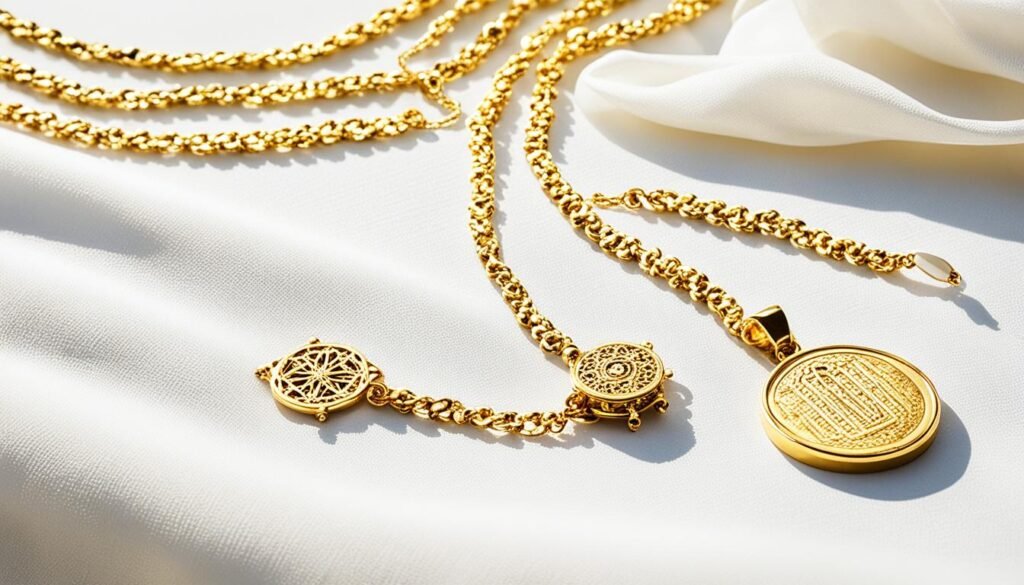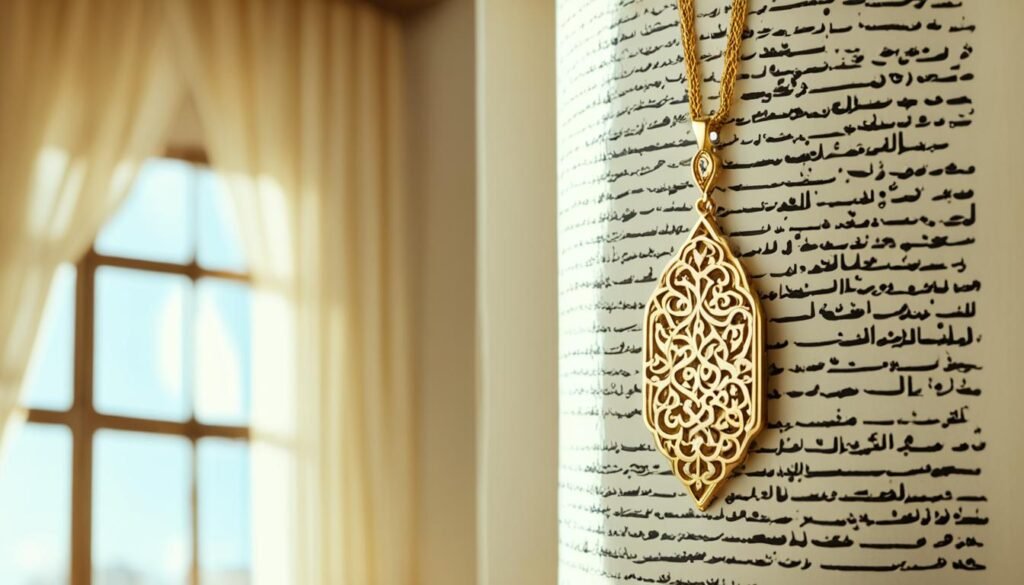Can a piece of jewelry challenge centuries of religious beliefs? Can Muslims Wear Gold? The topic of wearing gold in Islam brings up many questions. Many Muslims value jewelry for its cultural significance. Yet, there’s confusion about the rules on gold in Islam.
We will look into both traditional and modern views on Muslim jewelry rules. We’ll see if wearing gold matches with Islamic beliefs.

Understanding Islamic Guidelines on Jewelry
Islamic teachings on adornment stress the importance of jewelry and modesty. The Quran doesn’t directly ban jewelry, but it encourages simplicity. It warns against too much extravagance. Many see this as a guide, saying too much jewelry can lead to vanity, taking away from faith.
Some believe that wearing gold and silver jewelry is forbidden, based on the prophet Muhammad’s teachings. This belief has led many to avoid precious metals. They prefer halal jewelry made from natural materials, avoiding harmful substances like lead and mercury.
Wooden jewelry is popular among Muslim women who want to be modest. It fits Islamic values by using natural materials and being simple. For events like weddings, it’s important to choose jewelry that follows Islamic rules. Make sure it’s appropriate and doesn’t have symbols of other religions.
Women are urged to wear jewelry that respects their culture but doesn’t draw too much attention. Jewelry shouldn’t be worn to show off wealth or status. The reason for wearing it should match Islamic values, focusing on modesty and respect.
Historical Context of Gold Prohibition in Islam
The history of gold in Islam is complex, mixing religious teachings with social norms. Early on, the Prophet Muhammad banned gold and silk to stop vanity and materialism. He wanted people to focus on spiritual values and community, not just wealth.
Islamic culture has shaped how people view gold jewelry over time. The Prophet said men shouldn’t wear gold rings or use gold and silver for eating and drinking. He chose to wear a silver ring to show his followers a simpler way to live.
Hadiths stress the importance of following rules, telling men to avoid gold and silk. Scholars say there’s a big difference between real gold and fake or mixed items. This shows how important being true to Islamic values is. Over time, Muslims have had different views on gold based on their situations, making the story of gold in Islam rich and varied.
Can Muslims Wear Gold: The Islamic Perspective
The debate over the hadith gold prohibition focuses on key sayings from the Prophet Muhammad. These teachings guide Muslims on using gold and silver jewelry. They stress the need for modesty and warn against showing off wealth.
The Hadith Regarding Gold
A key hadith says that gold and silk are okay for women but not for men. This rule shows men can’t wear gold, but women have some leeway. Scholars believe this rule helps prevent pride and keep followers humble.
Scholarly Opinions on Wearing Gold
There are many views on gold jewelry among scholars. Some think the ban is more about culture than religion. They question if gold use really goes against Islamic teachings. Others stick to the hadith gold prohibition, saying it’s key to staying modest and true to Islamic values.
There’s also debate on if gold-plated or non-pure gold is allowed. Some scholars suggest choosing jewelry wisely. As Muslims look for halal-certified jewelry, their choices are changing with these views in mind.

Exceptions to the Prohibition of Gold Jewelry
Islam generally doesn’t allow gold jewelry. But, there are exceptions, like during weddings. Gold jewelry is okay then because it celebrates the union.
Special Occasions: Weddings and Celebrations
Weddings let people use gold jewelry, making them special. Islamic wedding jewelry adds to the joy of these events. It shows beauty, happiness, and good luck.
Even though gold is usually not allowed, weddings have their own rules. These rules make exceptions to gold prohibition okay.
Halal-Certified Jewelry
Halal jewelry is another interesting topic. It’s made following Islamic rules. This means it’s ethical and good for Muslims.
Halal-certified jewelry can be made from different materials. It respects modesty and morality. So, gold jewelry can be made in a way that’s okay in Islam.
Islamic Views on Gold Jewelry for Men and Women
In Islamic teachings, there are specific rules about gold jewelry, especially for men and women. Men are usually not allowed to wear gold jewelry. This comes from hadiths that say men should not wear gold. It’s to keep men modest and not copy women’s jewelry styles.
Many scholars say men should not wear gold items like rings or watches. They see it as haram, or forbidden. This rule helps men stay true to Islamic teachings.
Women, however, can wear gold jewelry. They can wear things like gold rings and necklaces, especially for big events like weddings. This shows how important gold jewelry is in Islamic culture for women.
Now, there’s also halal-certified jewelry and items with Quranic verses. These are good choices for both men and women. They follow Islamic rules and let people express themselves with jewelry.
Islamic teachings stress modesty for everyone. Men and women are told not to wear too much jewelry. This keeps them humble and stops them from being vain.
Women can wear gold, but men should pick modest jewelry like silver rings or stones. This shows Islamic teachings about balance in life, including how we dress.
What Jewelry Is Permissible for Men?
In Islam, men’s jewelry has clear rules about what’s okay and what’s not. Gold jewelry has strict rules, showing Islamic values of modesty and humility. Men can wear some jewelry, but the type and design matter.
General Rules on Men’s Jewelry
The main rule for men’s jewelry is to keep it simple. Showing off wealth goes against Islamic teachings that value modest living. Jewelry made from silver and some precious stones is okay as permissible men’s jewelry. This lets men decorate themselves without breaking religious rules.
Specific Restrictions on Gold Items
The rules on gold jewelry are clear. Men can’t wear gold, like rings or watches. The Prophet Muhammad (PBUH) said to avoid gold to stop showing off and stay humble. Silver is okay, but gold means wealth and can distract from spiritual goals. So, men should choose jewelry that’s modest and avoid gold to follow religious advice.
Jewelry Choices for Muslim Women
In the world of women’s jewelry in Islam, it’s key to follow the rules on what’s okay to wear. Muslim women can wear jewelry, like gold, but there are limits. They should focus on being modest, avoiding jewelry that shows off too much wealth.
Permissible Types of Jewelry
There are many kinds of jewelry Muslim women can wear. Gold jewelry is often limited, but it’s okay for special events like weddings. Gold-plated items or those with less than 50% gold are also fine. Halal-certified jewelry is popular, letting women show their style without going against their faith.
Modesty in Jewelry Selection
Choosing jewelry with modesty in mind is important. It means picking pieces that show who you are but are simple. Avoid flashy jewelry and look for things like wooden jewelry that are elegant but don’t scream wealth. This way, Muslim women can have style and stay true to their beliefs.
Dealing with Gold-Plated and Non-Pure Gold Items
Gold-plated jewelry and non-pure gold have a special place in Islam. These items are okay as long as they don’t have much gold. This rule helps people enjoy jewelry without breaking Islamic rules on gold.
Men can’t wear pure gold, but they can wear gold-plated items. These items don’t have much gold. This rule helps men wear nice things without breaking Islamic rules. It’s all about making choices that respect both beauty and faith.
Women can wear gold jewelry because it’s part of their tradition. But, they must follow Islamic rules. It’s important to check if the gold is real and how it’s plated. Always look for clear information and talk to experts on Islamic guidelines on gold items to be sure.
Gold-plated and non-pure gold items let people enjoy beauty and follow Islamic values. If you’re interested, talk to scholars or trusted sources. This way, you can make choices that are both beautiful and faithful.
Cultural Nuances in the Acceptance of Gold Jewelry
The acceptance of gold jewelry varies a lot across different places and communities in Islam. These differences come from local traditions, history, and how people interpret Islamic teachings. Knowing these differences helps us see how gold jewelry fits into the lives of Muslims.
Regional Variations and Traditions
In South Asia, like Pakistan and Bangladesh, giving rings during the ‘Mangni’ engagement is a big tradition. But in places like Saudi Arabia and the UAE, gold bands are for women, and men choose silver because gold is forbidden for them. In Egypt and Morocco, the culture mixes Arab and Berber ways, leading to unique wedding rings.
What people like also affects how Muslims see jewelry. Some see rings as cultural symbols, not just religious items. This shows how diverse the Muslim community is. It’s important to clear up wrong ideas about wedding rings. These differences show the richness of cultures, not a lack of faith.
As Muslims meet and share with each other, their jewelry choices change. This shows how these traditions are always moving and changing. It also means the ways people see themselves and their cultures are always changing too.

Maintaining Modesty in Jewelry Use
In Islam, wearing jewelry modestly is very important. It shows the values of being humble and restrained. Both men and women should think about how their jewelry reflects respect, not just showing off.
Men are not allowed to wear gold jewelry, according to most scholars. This teaches them to be simple and avoid being vain. They should dress modestly and cover themselves when they are with others. This shows respect for Islamic values and helps everyone feel more respected.
Women can wear gold jewelry if it’s modest and doesn’t draw too much attention. Scholars agree that it should be worn with modesty in mind. This way, women can still follow Islamic teachings while expressing themselves through jewelry.
There are different opinions in the Muslim world about what modesty means today. Some stick to traditional ways, while others suggest new ways to follow Islamic values. Finding a middle ground is key for Muslims who want to be modest in their jewelry choices.
FAQ
Can Muslims Wear Gold?
What are the Islamic guidelines on jewelry?
What historical reasons contribute to the prohibition of gold?
What does the Hadith say about gold jewelry?
Are there exceptions to the prohibition of gold jewelry?
What are the guidelines for men regarding jewelry?
What types of jewelry are permissible for women in Islam?
What is the stance on gold-plated and non-pure gold items?
How does cultural context influence the acceptance of gold jewelry?
How can Muslims maintain modesty in their jewelry use?

Embracing Faith, One Insight at a Time!
The teachings of the Quran have always guided my path. With a deep passion for Islamic knowledge, I strive to blend the wisdom of tradition with the relevance of today, making the timeless messages of Islam accessible and meaningful for everyone.
Muslim Culture Hub is my platform to share historical insights and thought-provoking articles, exploring both well-known and lesser-discussed aspects of Islamic culture and beliefs. My mission is to create an inclusive online space where everyone can learn, strengthen their faith, and connect with the profound message of Islam.
Join the journey!
May peace be upon you.








